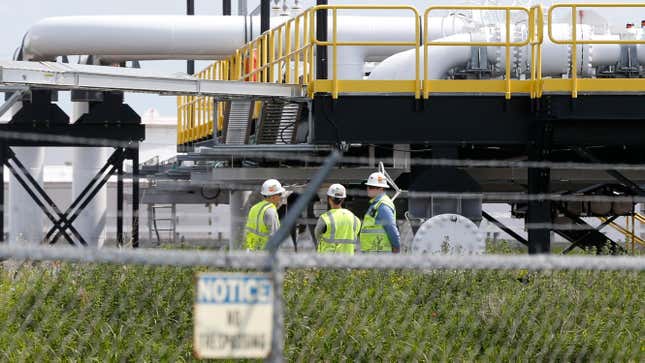
The man heading up security for the oil transport company Enbridge, which is currently facing down an Indigenuous-led protest movement against the Line 3 pipeline, formerly helped Exxon shield its operations from demonstrations in Nigeria and oversaw global security for Amazon.
The Intercept recently reported that Enbridge’s head of security, Troy Kirby, likely built a handbook of the kind of corporate counter-insurgency tactics experts say energy companies have applied towards environmental activists in recent years.
Kirby’s LinkedIn page shows that before coming to Enbridge in 2019, he spent three years as the head of Amazon’s corporate security. Documents dated to his final year there obtained by Vice show that under Kirby’s leadership, Amazon security monitored social media posts by union organizers and environmental activists. Vice reported that Amazon dispatched operatives from the infamous Pinkerton agency to investigate reports of employee misconduct at a facility in Poland.
For at least four years before his stint at Amazon, the Intercept reported, Kirby worked for Exxon as an adviser on “strategic security countermeasures” in Nigeria. The Intercept reported that the job responsibilities on Kirby’s LinkedIn page were deleted, but a previous version of his page showed they included managing crises including pirate attacks, employee kidnappings, and “community protests.” Accomplishments listed included “[Establishing] a Nigerian based security network with private and public sector security leaders” and “Oversight of host government security forces,” such as managing a “Security Maritime Operations center including a fleet of 17 military-grade security vessels” that protected Exxon’s offshore oil platforms.
Several items on Kirby’s LinkedIn, including the details of his jobs at Amazon and Exxon Mobil, have since disappeared. His page currently says only that he is the chief security officer for an “energy company.”
Some lessons that Kirby may have brought to helping Enbridge build Line 3 in Minnesota include payments to local police forces for their role in keeping protesters from interfering with construction, the Intercept wrote. Enbridge has also trained police and received invites to police intelligence meetings where the details of local activists are discussed and shared between agencies. Local agencies such as the Aitkin County Sheriff’s Office have aggressively monitored social media activity by prominent activists in order to rack up evidence for charges. The Minnesota Public Utilities Commission set up a special Enbridge-funded escrow account to pay for the time and equipment of local authorities protecting Line 3; according to the Intercept, Kirby assured a local sheriff that Enbridge wielded influence over who would become the public official in charge of determining reimbursements.
There’s another Amazon connection as well, the Intercept wrote: Enbridge Line 3 security lead Brian Aldrich, a former Marine who has bounced around major security firms who was once part of CEO Jeff Bezos’s security detail. Securitas, the company that owns Pinkerton, is also one of Line 3's primary private security providers.
It’s hardly private companies cracking down on protesters. Several states with governments controlled by right-wingers have launched draconian laws that target Indigenous and other environmental protesters. This year, the Montana legislature passed a bill that could impose $150,000 fines and 30 years of prison time for anyone involved in anti-pipeline “vandalism,” following the lead of three other states that designated pipelines critical infrastructure and thus carrying harsher penalties against those convicted of interfering with their operations.
The reason fossil fuel companies and politicians that enable them have pushed back so hard on Indigenous protesters is that those movements have had some major success in stopping oil and gas infrastructure for going into operation. A recent report by the Indigenous Environmental Network and Oil Change International examined 21 protest movements against oil and gas infrastructure, including the Keystone XL, Dakota Access, and Line 3 pipelines, as well as more obscure projects such as a proposed Rio Grande liquified natural gas export terminal in Texas and the San Juan oil and gas basin in New Mexico. The analysts found the activists were successful at stopping around 1.6 billion metric tons of carbon dioxide equivalent from being pumped into the atmosphere, accounting for about 24% of the annual total greenhouse gas emissions in the U.S. and Canada. Opposition to pipelines alone averted 779 million tons of carbon dioxide equivalent.
New oil and gas exploration must end next year to protect us from the worst impacts of climate change. Indigenous-led movements have been incredibly effective at turning the tide, but it’s clear oil and as companies are pulling out all the stops to keep the fossil fuels flowing.
Enbridge declined to make Kirby available for an interview with the Intercept, though spokesperson Juli Kellner told the site “Security teams use a ‘people first’ concept to ensure public safety—their mission is to observe, respond, and report safety issues.”